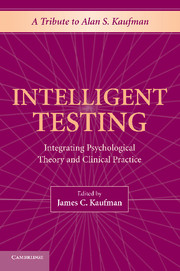Book contents
- Frontmatter
- Contents
- Acknowledgments
- Alphabetical List of Authors and Affiliations
- PART ONE THOSE WHO KNOW HIM
- PART TWO INTELLIGENT TESTING
- PART THREE THE INTERSECTION OF THEORY AND MEASUREMENT
- 8 Kaufman on Theory, Measurement, Interpretation, and Fairness: A Legacy in Training, Practice, and Research
- 9 The Theory of Successful Intelligence as a Basis for New Forms of Ability Testing at the High School, College, and Graduate School Levels
- 10 Kaufman's Work in the Penumbra between Measurement Science and Clinical Assessment
- 11 Success Is a Latent Variable: How Alan Kaufman Shaped Intelligence Test Theory, Interpretation, and Psychometrics with Factor Analysis
- PART FOUR KAUFMAN ACROSS THE WORLD
- Author Index
- Subject Index
- References
9 - The Theory of Successful Intelligence as a Basis for New Forms of Ability Testing at the High School, College, and Graduate School Levels
Published online by Cambridge University Press: 05 August 2012
- Frontmatter
- Contents
- Acknowledgments
- Alphabetical List of Authors and Affiliations
- PART ONE THOSE WHO KNOW HIM
- PART TWO INTELLIGENT TESTING
- PART THREE THE INTERSECTION OF THEORY AND MEASUREMENT
- 8 Kaufman on Theory, Measurement, Interpretation, and Fairness: A Legacy in Training, Practice, and Research
- 9 The Theory of Successful Intelligence as a Basis for New Forms of Ability Testing at the High School, College, and Graduate School Levels
- 10 Kaufman's Work in the Penumbra between Measurement Science and Clinical Assessment
- 11 Success Is a Latent Variable: How Alan Kaufman Shaped Intelligence Test Theory, Interpretation, and Psychometrics with Factor Analysis
- PART FOUR KAUFMAN ACROSS THE WORLD
- Author Index
- Subject Index
- References
Summary
AN APPRECIATION
I first met Alan S. Kaufman in 1968 when I was 18 years old. I had gone to work in New York City as a research assistant in the Test Division at the Psychological Corporation. Kaufman was a high-level staff member. He was older than I was, but not by all that much! We had only brief and casual contact. I had no idea at the time that this man would become a one-man publishing industry. Perhaps that is an overstatement. Much of his work has been done with his wife, Nadeen, as well as other collaborators, including his son James, who many years later was to become one of my graduate students, and shortly afterward, another one-man publishing industry. It runs in the family.
If one were to ask who are the people who most have influenced and impacted ability testing, almost certainly Alfred Binet would be #1. David Wechsler would probably be #2. In my mind, Alan Kaufman would be #3. And in terms of productivity, he surpassed Binet and Wechsler relatively early in his career. Kaufman's career started with his writing books for psychologists to help them administer conventional standardized tests. He has continued to author and coauthor such books, even to the present day (e.g., Flanagan & Kaufman, 2004; Kaufman & Lichtenberger, 1999, 2005; Lichtenberger & Kaufman, 2003). But far more important than these books have been his tests, which have reshaped the industry (see Kaufman, Lichtenberger, Fletcher-Janzen, & Kaufman, 2005; Lichtenberger, Broadbooks, & Kaufman, 2005).
- Type
- Chapter
- Information
- Intelligent TestingIntegrating Psychological Theory and Clinical Practice, pp. 113 - 147Publisher: Cambridge University PressPrint publication year: 2009

